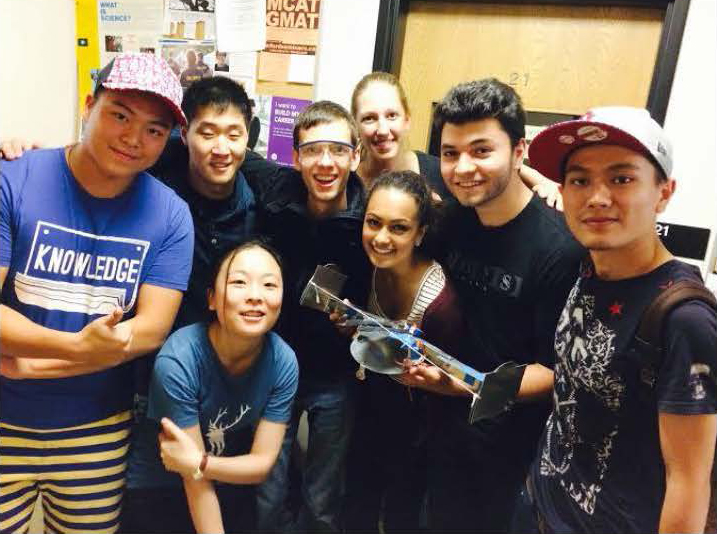First year engineering students brought theory to life this term, thanks to an exciting new hands-on, team-based design challenge created by Civil Instructor Dr. Nobo Yonemitsu and innovative IGEN students.
APSC 150, Engineering Case Studies, introduces students to the engineering design process. The course is divided into a series of cases presented by different engineering instructors. For Case I this year, Dr. Yonemitsu conceived of an innovative approach to delivering the material and measuring learning outcomes – students would experience hands-on design and real performance testing instead of traditional lectures and tutorials; and a poster presentation instead of a quiz to demonstrate their understanding of the principles introduced by the case.
Students were grouped into teams and were tasked with designing and constructing an operable projectile launcher that could shoot a cork at a target twelve feet away. The teams were challenged to set design goals; build two prototypes and analyze their performances; optimize the stronger of the two designs for competition; and finally, construct their launchers under resource and time constraints.
In an action-packed live evening demonstration, the launchers were tested for distance performance, in a contest that permitted teams 90 seconds to prove the effectiveness of their designs. First place in the launcher demonstration competition went to “Favrojac,” a crossbow-style machine that was found to be capable of launching the cork to distance of over fifteen metres with just a single rubber band! Curtis Huebner, Alycia Doering, Jason Hsin, Rosemarie Nederend, Obada Sameh, Zhang Ares, Fang Shen, and Verde Chi made up the winning team, who were awarded the opportunity to have lunch with Dean Parlange as a result of their first-place result.
Students were peer-evaluated on their performance in the accompanying poster presentation, wherein they were required to professionally communicate their methodology, findings and recommendations for a solution to the design challenge. The projectile launcher challenge gave students the opportunity to apply their newfound technical knowledge to a real design problem; and to hone their communication, presentation, and teamwork skills.
Dr. Yonemitsu noted that engagement in Case I was remarkably high, with participation in tutorials consistently at 100 per cent. Students expressed appreciation for this unique approach to an engineering case study, commenting in one instance: “We really appreciate the opportunity you gave us to get our first real taste of engineering through building the prototype launchers …the evening was a ton of fun and we learned so much about engineering in the process.” Dr. Yonemitsu drew on resources from UBC’s Teaching and Learning Enhancement Fund (TLEF) to develop the materials for this case; and relied heavily on third year IGEN students Jonathan Lassam and Nik Radosevic, who were employed as summer work-learn students to help develop this project. Dr. Yonemitsu notes: “Without their help we could not have created such an interesting activity for Case I!” Dr. Yonemitsu is also grateful for the efforts of the tutorial session instruction team, and the course coordinator, Professor Bhushan Gopaluni of the Department of Chemical and Biological Engineering. Congratulations to all who helped make this first APSC 150 case a success!
